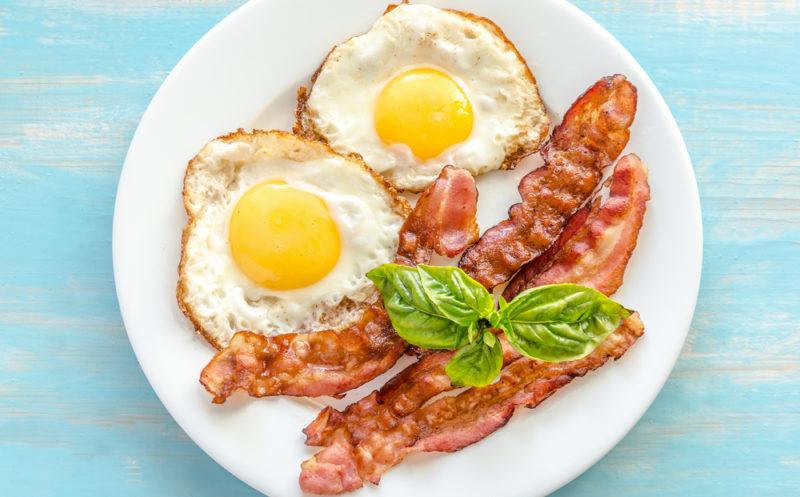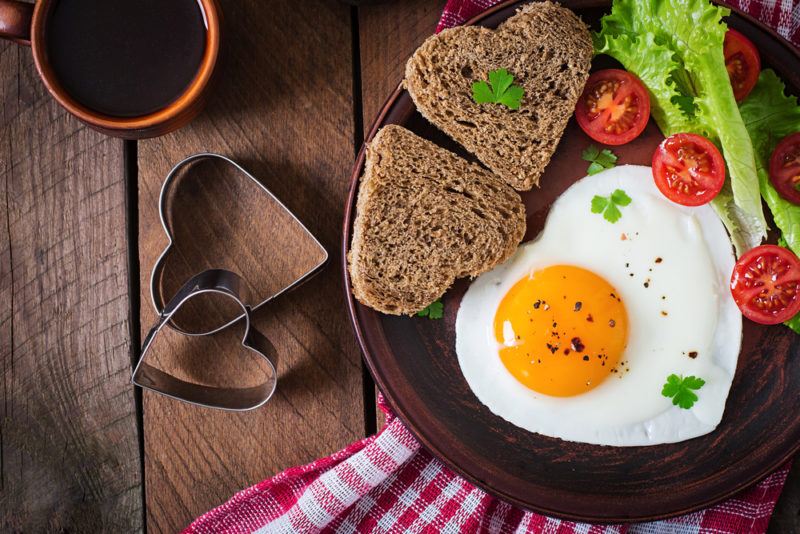
The debate surrounding eggs is a longstanding one. We’ve often been told that these little morsels are incredibly unhealthy, perhaps as bad for you as smoking cigarettes. But, these days, eggs are popular breakfast fare. So, what’s going on? Are eggs good for you or not?
As with most foods, the answer is complex. After all, eggs have a lot going on. They contain cholesterol, which has been linked to heart disease risk, and they’re also relatively high in calories. On the flipside, they offer a decent number of nutrients, are easy to use, and are filling.
We’re going to take a look at both sides of the debate in this post and also talk about how to use eggs in the healthiest ways.
It’s also worth mentioning that the health impacts of eggs aren’t as complex as you might think. There’s certainly less controversy and confusion for eggs than for topics like coconut oil or even butter.
P.S. If you do want to skip eggs, there are plenty of egg substitutes out there. Many of these rely on simple ingredients from your kitchen.
Are Eggs Good For You?
- The Problems With Eggs
- Benefits Of Eggs
- Getting The Most Out Of Eggs
- Final Thoughts
The Problems With Eggs

We normally talk about the benefits of a food before anything else. We’re not going to do that with eggs because the issue of cholesterol in eggs is such a well-known issue. So, let’s take a look at the problems that surround eggs and why some of them aren’t as bad as you might imagine.
Cholesterol
Cholesterol is a compound that our bodies rely on for many things, including the creation of cell membranes and some hormones. It circulates in our bloodstream, but while it is absolutely essential, high levels of cholesterol may cause harm.
Cholesterol falls into two main types. One is High Density Lipoprotein (HDL) and the other is Low Density Lipoprotein (LDL). HDL is generally seen as ‘good’ cholesterol, while LDL is ‘bad’ instead.
The problem is that high levels of cholesterol, particularly LDL cholesterol, are thought to increase the risk of heart disease.
Eggs have been vilified for so long because their cholesterol content is notable. Seriously. You get around 180 mg of cholesterol from a single large egg. That’s more than half of the previous guidelines for daily cholesterol intake. Having two eggs for breakfast could take you over that recommendation before it was even past 9 am.
It’s easy to see why people tried to cut out eggs.
Here’s the thing… cholesterol isn’t just something that we get from food. Our bodies make the compound too. Eating a low cholesterol diet doesn’t necessarily make your cholesterol levels any lower, as your body just makes up the difference.
Cholesterol in your diet often doesn’t have much effect at all, which is partly why there isn’t a recommended figure for cholesterol intake these days (although, some foods are better than others when you have high cholesterol).
Studies have found that for around 70% of people, eggs don’t raise their LDL cholesterol levels at all. There is an effect for the other 30%, but this is slight. Interestingly, people in this 30% see a change in the type of LDL cholesterol. The particles change from small and dense LDL particles to large, a switch that may decrease the risk of heart disease.
For that matter, studies consistently show that eggs can be part of a healthy diet. Harvard studies, for example, show that one egg per day doesn’t increase heart disease risk at all. This makes eggs for breakfast a much safer idea.
Finally, the link between cholesterol and heart disease isn’t as solid as you might think. Modern recommendations focus on decreasing saturated fat and trans fat intake instead, as there’s a stronger link between these fats and heart disease.
Fat And Calories

Eggs are sometimes seen as a high fat and high calorie food too, making them even more controversial. This is one reason why dieters often stick to egg whites, rather than egg yolks.
However, calories aren’t the be-all-end-all. They’re a useful guide, sure, but some high calorie foods are nutrient dense and are fantastic additions to your diet. High calorie foods can be filling too, as some of those calories come from fat and protein, which are satiating. This means that calories alone aren’t a reason to cut foods out of your diet.
Besides, at somewhere between 60 and 80 calories in an egg, eggs aren’t as bad as you might think. A two-egg breakfast actually contains fewer calories than many other breakfast meals.
These calories are offset by the protein content of eggs. This protein means that eggs tend to be satisfying. They can keep you full for hours. Eating eggs for breakfast has even been linked to improved weight loss in some situations.
Think about eggs compared to cereal as a breakfast choice. Cereal is often high in carbs and sugar, which leads to a fairly high calorie content anyway (even before you add the milk). You’ll often get a blood sugar spike from the meal and it won’t keep you full for long.
Animal-Based
The final issue is well-known too. Eggs come from chickens, chickens that are sometimes cruelly treated. Many people avoid eggs for this reason.
However, chicken farms aren’t all equal. Some treat their chickens much better than others. If this is an area that worries you, you can look out for free range eggs,
You don’t need to stick to the company’s claims either, as some products are authenticated as Animal Welfare Approved or Certified Humane. Plus, consumer watchdog groups often list which companies live up to their claims and which ones don’t.
Benefits Of Eggs

As you can see, eggs are linked to some notable problems, but none are as bad as they first appear. Instead, eggs can easily be a part of a healthy diet, as long as you don’t go overboard. That brings us to the next topic – what eggs have to offer.
Protein
Eggs are an easy source of protein, giving you around 6 to 7 grams of protein per egg (the exact amount depends on the size of your egg). Most of this protein comes from the egg white, but you get a decent amount from the yolk too.
Protein is an essential part of your diet. It helps you to build muscle and to improve your bone health, while also keeping you healthy overall.
Plus, protein is filling. A high protein meal will keep you satisfied for much longer than one that’s high in carbs and low in protein. This is why eggs are often recommended for breakfast.
Because eggs come from chickens, they’re also a quality source of protein. This means they contain all the essential amino acids – the ones that we need and can’t produce ourselves.
Nutrients
Eggs are sometimes called nutrient powerhouses. This isn’t so surprising. After all, eggs are meant to provide all the nutrients for the baby chicken to develop.
With eggs, you’re getting a decent amount of selenium, various B vitamins, folate, calcium, zinc, and vitamin A. You even get vitamin D in eggs, which is an unusual feature.
One of the B vitamins, vitamin B12 is particularly important. Vegetarians and vegans can easily be deficient in this vitamin, as it primarily comes from animal-based foods. While vegans avoid eggs along with other animal products, other types of vegetarians can use eggs as a powerful source of vitamin B12.
There are also plenty of trace nutrients in eggs.
You won’t meet your daily intake of any vitamin or mineral from a couple of eggs, as an egg contains less than 10% of your recommended daily intake for most vitamins and minerals. But, this doesn’t matter, as you should be getting nutrients from a variety of foods, not just one or two.
Eggs are fantastic in this sense, as they boost your intake of many vitamins and minerals all at once, while also giving you a satisfying meal. Who could ask for more?
Flavor And Flexibility
Eggs are clearly a nutritious choice, but let’s be honest, eggs were popular even when we thought they were very unhealthy. The flavor is one reason for this. Eggs taste fantastic. There’s no denying that. Whether you’re having scrambled eggs, a poached egg for breakfast, or perhaps a fried egg in a burger, eggs are delicious.
Eggs also tend to be inexpensive, are easy to cook, and can be used in countless ways. We’re not kidding on that last point either. We covered 33 different ways to eat eggs in an earlier post and there were plenty of ideas that didn’t make that list, including pickled eggs and raw eggs. You can even get very creative and try ideas like making pickled eggs with pickle juice.
Egg-based dishes like omelets, poached eggs on toast, scrambled eggs, or simply a hard boiled egg can often be prepared in less than 10 minutes. This is another reason that eggs are the star of breakfast tables – who wants long cook times first thing in the morning?
You’ll see eggs used in countless recipes too. They’re a perfect way to add nutrients and protein to a meal. Plus, if you have too many eggs, you can always freeze some and come back to them later.
Getting The Most Out Of Eggs

There’s no doubt that eggs are healthy. Still, how you use them plays a large role in whether they help or harm you.
What You Eat With Them
One thing is what you serve with your eggs. Eggs are often paired with high fat foods, like cheese and bacon. Plus, you might be cooking them in oil or butter. Such combinations all increase the calorie content of your meal.
Be careful about adding salt to your meal too. Many of us consume too much sodium as it is and high sodium intake can increase heart disease risk. Besides, eggs have plenty of flavor on their own, they hardly need the extra salt.
How You Cook Them
Your cooking method influences the meal too. For one thing, eggs are more digestible once they’ve been cooked – so adding a raw egg to your smoothie is less powerful than having cooked eggs for breakfast.
If you simply poach the egg, then the calorie content ends up around 72 calories, while hard boiling it gives you 78 or so calories instead. The calorie content is higher for fried eggs, probably because of the cooking oil that you use. And, of course, when you include your egg in an omelet or scrambled eggs, you’re starting to add other ingredients that influence the nutrition of your meal.
Don’t get me wrong. Omelets, scrambled eggs, poached eggs, are all healthy and delicious, as are plenty of other ways to eat eggs. Even fried eggs can be healthy, as the amount of oil is rarely excessive.
More than anything, the trick is to pay attention to your ingredients. Make sure you’re adding reasonable amounts and that you’re not relying too heavily on high calorie ingredients.
The Amount You Eat
Recommendations on the number of eggs per day vary depending on where you look. Some groups suggest limiting yourself to three or four eggs per week, while Harvard Health now says that an egg per day is safe for most people. This can be taken even further too – and as many as three eggs per day could be completely fine if you’re healthy.
Most suggestions focus on the number of eggs per day, but of course, that’s not the whole story. Eggs come in different sizes and each size varies in its calorie and nutrient content. For example, a raw small egg only contains around 54 calories and a raw jumbo egg contains 90 calories.
That’s a dramatic difference.
Because of this, you might need to decrease the number of eggs if you’re focusing on large or jumbo eggs, rather than medium ones.
Final Thoughts

Eggs clearly aren’t the dietary villains that we often assume. Their high cholesterol levels don’t have a strong impact on our blood cholesterol levels and even when they affect cholesterol a little, the effect isn’t translated into increased heart disease risk.
Besides, who can ignore all that eggs have to offer , including their nutritional profile and how easy they are to use?
Just pay attention to the amount you eat and what you serve with eggs. After all, it’s easy to have too much of a good thing.
Frequently Asked Questions
Do Eggs Need To Be Refrigerated?
This one actually depends on where you live. If you are in the United States, then eggs should be kept in the fridge. This is because eggshells are porous and can take on Salmonella bacteria from hens.
To prevent this, the eggs are then washed. While the washing removes the Salmonella, but also removes some of the egg’s natural protection, making them sensitive to contamination.
Because of this, keeping eggs in the fridge is essential to prevent excessive bacterial growth.
This isn’t the case in most other countries, as farming practices are different. So, if you’re in the UK, New Zealand, or many other places, you don’t need to refrigerate eggs at all.
Are Eggs Gluten Free?
Eggs are sometimes lumped into the dairy category, which is odd, as they’re not dairy at all. They’re certainly not derived from milk and are entirely safe for anyone who’s sensitive to dairy.
There are some common properties though, as eggs and dairy are both derived from animals, are high in protein, and provide a range of nutrients.
Are Eggs Good For Diabetics?
Eggs can be excellent for diabetics, as they’re high in protein and low in sugar. This combination means they help with blood sugar regulation.
In fact, eating eggs with high carb foods could lead to more stable blood sugar levels than high carb foods on their own. Eggs also contain plenty of nutrients, which help to promote your health and keep you doing well.
Are Eggs Fattening?
Eggs are surprisingly good for weight loss, as a large egg only contains around 74 calories. You also get a lot of nutrients and protein for that low calorie count.
The protein is particularly important, as this keeps you satisfied and can stop you craving junk food. This is why having eggs regularly for breakfast often leads to more weight loss than a high carb breakfast.
Are Eggs Vegetarian?
A vegetarian diet means that you’re not eating animal flesh, which includes poultry, red meat, and sometimes seafood. Eggs aren’t animal flesh nor is an animal killed to produce them. This makes them perfectly fine in a regular vegetarian diet.
Then there’s veganism. This is a stricter type of vegetarian diet, where you’re also excluding dairy, eggs, and sometimes honey. So, if you’re a vegan, eggs are off the table. If you’re another type of vegetarian, eggs aren’t an issue at all.









 The Best Peanut Butter Whiskey
The Best Peanut Butter Whiskey
Leave a Reply